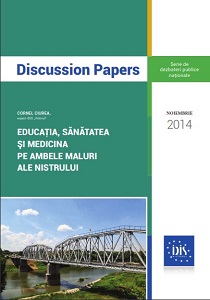Educaţia, Sănătatea şi Medicina pe ambele maluri ale Nistrului
Education, Health and Medicine on both banks of the Dniester
Author(s): Cornel Ciurea
Subject(s): Security and defense, Health and medicine and law, Peace and Conflict Studies
Published by: IDIS VIITORUL Institutul pentru Dezoltare şi Initiative Sociale
Keywords: Moldova-Transnistria;
Summary/Abstract: The discussions of experts from both banks of the Dniester focused on the bilateral issues that exist between Chisinau and Tiraspol in the field of education, health and medicine, and on the possibilities of initiating joint projects. // A serious problem in the relations between the two banks of the Dniester that affects all levels of education is related to the different format of education systems. There are no baccalaureate exams in Transnistria, and pre-university education lasts 11 years (unlike Moldova where young people study for 12 years). Because of this, young people graduating from Moldovan schools in Transnistria with Cyrillic script are forced to study for a year in the Republic of Moldova and only after passing the baccalaureate, they have the right to be enrolled in higher education institutions on the right bank of the Dniester. Compatibility issues also exist at other levels of study - university cycle I and II, doctorate and employment of teachers. In the absence of close control by the Ministry of Education, the exact procedures by which young Transnistrians end up studying at higher education institutions in Moldova or working as teachers are not known. For example, there are known cases when graduates of pedagogical institutions in Transnistria are employed as Romanian language teachers in schools on the right bank, although they have studied Romanian in Cyrillic script.
Series: IDIS DIscussion Papers
- Page Count: 11
- Publication Year: 2014
- Language: Romanian
- Content File-PDF

